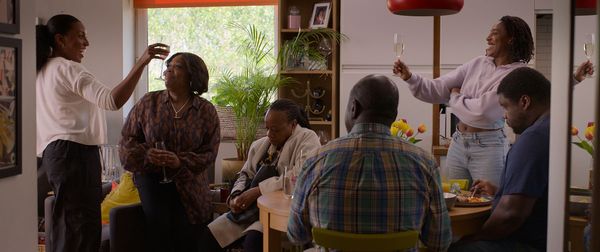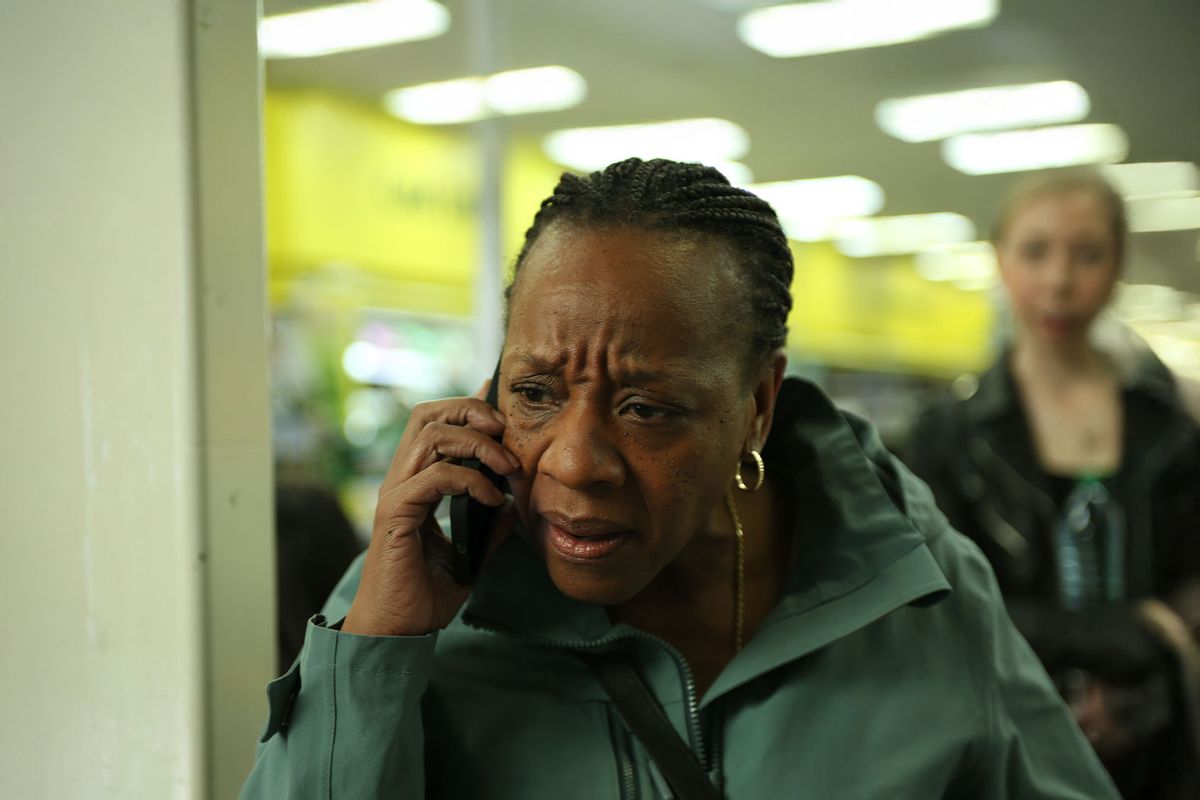Ruminate on the title of the latest film from acclaimed British writer-director Mike Leigh, “Hard Truths,” and you’ll find it's comically ironic. Leigh’s movies have always relied on their titles to convey their contents plainly. Take 2008’s “Happy-Go-Lucky” about a perennial optimist whose cheery disposition irks everyone around her; or 1996’s “Secrets & Lies,” a tale of hidden secrets and — you guessed it! — lies. And though their titles may be frank, their stories are anything but. Leigh’s are uncomplicated films about incredibly complicated people, which is why calling his newest “Hard Truths” produces a chuckle: Sure, this is a movie about realities that are difficult to accept, but Leigh has been sharply focused on the hard truths of human life for his entire career.
Leigh never lets his audience escape the underlying humiliation and helplessness Pansy feels, and Pansy never allows herself that grace either.
In that respect, calling the film “Hard Truths” almost implies a well-earned victory lap for a filmmaker who has dedicated his work to elucidating the complexities of the human condition, especially because the movie also finds Leigh reuniting with one of his foremost collaborators in Marianne Jean-Baptiste. The two worked together in a play Leigh put up in 1993, and again in “Secrets & Lies,” which earned Jean-Baptiste an Oscar nomination for her quietly stirring work as a young woman pursuing the identity of her birth mother. The same year she was nominated for an Oscar, Jean-Baptiste wrote the score and original songs for Leigh’s follow-up, “Career Girls.” Theirs is the kind of fruitful artistic partnership that is more reliant on the work to tell the story of their intimate connection and trust, rather than any sort of conventional glamour and reverence you’d see heaped onto a director and their muse a tad closer to Hollywood.
The unassuming closeness between the two artists is back on display in “Hard Truths,” which sees a powerhouse lead role for Jean-Baptiste and a formal exercise in potent, approachable filmmaking for Leigh. Here, Jean-Baptiste plays Pansy, a mother and a wife consumed and exasperated by the cellular indignation she feels daily. Pansy takes umbrage with just about everything in life: parking lot dynamics, cheery store associates, the noise of the outside world, the decorative pockets on baby clothes. Everything, including her husband Curtley (David Webber) and her son Moses (Tuwaine Barrett), creates a grievance for Pansy.
While Leigh plays some of Pansy’s frustrations for laughs, even the funniest of her complaints have a deep somberness embedded into their core. “Hard Truths” is deceptively difficult to watch. Leigh never lets his audience escape the underlying humiliation and helplessness Pansy feels, and Pansy never allows herself that grace either. The film is a blistering character study by one of cinema’s great humanist storytellers, made all the more mesmerizing by its stunning star. And really, the latest in Jean-Baptiste and Leigh’s longstanding creative partnership deserves all the same veneration lobbed at Martin Scorsese and Robert De Niro, Wes Anderson and Bill Murray, or any of the other notable industry directors and their onscreen muses. “Hard Truths” is a film for a world that has only gotten angrier, yet its prolific central collaboration cleverly suggests that enduring mutual respect is a force powerful enough to combat such profound rage.
 Ani Nelson, Michele Austin, Marianne Jean-Baptiste, Tuwaine Barrett, Sophia Brown, and David Webber in "Hard Truths" (Courtesy of Simon Mein / Thin Man Films Ltd / Bleecker Street)But to fight that enemy, we must first know it, and Leigh’s film is a brutally detailed picture of deeply set pain that’s impossible to watch without being moved in one way or another. Because Leigh’s characters are so realistic, it’s easy to see them as proxies for ourselves and, in turn, be affected by their behavior and their many intricacies. Jean-Baptiste has credited this verisimilitude to Leigh’s intensive rehearsal process, where he and his actors work together to create characters from the ground up before shooting ever begins. That intrinsic level of care is present in “Hard Truths,” but without the fussiness that often feels present in films made by notorious perfectionists. One could argue that “Hard Truths” is so austere that it’s altogether unstylish. The film is an admittedly flat, digital production that wouldn’t look out of place if it were bookended by pharmaceutical advertisements while being watched with the free plan of a streaming platform. But that starkness also provides “Hard Truths” with a realism that allows viewers to focus on what's most important: the characters.
Ani Nelson, Michele Austin, Marianne Jean-Baptiste, Tuwaine Barrett, Sophia Brown, and David Webber in "Hard Truths" (Courtesy of Simon Mein / Thin Man Films Ltd / Bleecker Street)But to fight that enemy, we must first know it, and Leigh’s film is a brutally detailed picture of deeply set pain that’s impossible to watch without being moved in one way or another. Because Leigh’s characters are so realistic, it’s easy to see them as proxies for ourselves and, in turn, be affected by their behavior and their many intricacies. Jean-Baptiste has credited this verisimilitude to Leigh’s intensive rehearsal process, where he and his actors work together to create characters from the ground up before shooting ever begins. That intrinsic level of care is present in “Hard Truths,” but without the fussiness that often feels present in films made by notorious perfectionists. One could argue that “Hard Truths” is so austere that it’s altogether unstylish. The film is an admittedly flat, digital production that wouldn’t look out of place if it were bookended by pharmaceutical advertisements while being watched with the free plan of a streaming platform. But that starkness also provides “Hard Truths” with a realism that allows viewers to focus on what's most important: the characters.
As mercurial as Pansy can be, it’s difficult not to fall in love with her at first sight. Her prickliness makes her fascinating and multitextured, though that allure quickly wears thin for those who find themselves pulled into her orbit. Moses is most often on the receiving end of Pansy’s incessant lecturing, as she questions her son’s motivations and life prospects every chance she gets. There is no talking behind the back with Pansy, she doesn’t mind if anyone else hears. Even when Moses heeds his mother’s word and gets out of the house for his long, daily walks, Pansy launches another problem at him. “They’ll accuse you of loitering with intent,” she tells him. Moses — along with everyone else Pansy comes into contact with — is damned if he does and damned if he doesn’t.
Want a daily wrap-up of all the news and commentary Salon has to offer? Subscribe to our morning newsletter, Crash Course.
Though it’s never explicitly said, part of Pansy’s ire stems from her inability to contend with the injustices she faces as a Black woman in the contemporary world. Abject violence hangs over her mind like a pall, and when her fear gnarls itself into irritation, she knows exactly how white people in the queue at the supermarket or a furniture store will look at her. Her vexation then turns into humiliation and shame, then to debilitating depression. It’s the most vicious of cycles, made all the more difficult by the fact that she feels like a spectator in her own life, seeing everyone around her enjoy themselves when she’s patently unable to do the same. Her sister, Chantelle (Michele Austin, another repeat collaborator with Leigh), has a career she loves and two daughters she’s exceedingly proud of. Watching her sibling bask in life’s simple pleasures stirs some resentment in Pansy, but the prevailing feeling she experiences observing Chantelle isn’t jealousy, it’s misery.
“Hard Truths” is sublime and soft in the way that a rough surface is smoothed to the touch by sandpaper.
We are afforded some glimpses at why Pansy acts the way she does, but never any full explanation or justification. Instead, Leigh asks us to put the pieces together, to recall shades of people we’ve seen and known who behave similarly, if not our own deep-seated anger. In this way, Leigh and Jean-Baptiste force empathy’s hand. Much of “Hard Truths” reminded me of the confusion and anger dementia patients often display as their means to convey feeling overwhelmed, and my own experience witnessing the ramifications of that turmoil. But neither Leigh nor Jean-Baptiste ever makes Pansy feel like a spectacle, and it’s extraordinarily powerful to see a character so richly crafted be approached with care and love, even if those around her can’t fully understand her pain.
The question of whether (and how) Pansy’s overbearing exasperation and distrust will affect her family, most notably Moses, lingers in the ether until the film’s touching climax and unforgettable ending. The way Leigh concludes “Hard Truths” bowled me over with its sheer simplicity. The movie’s final 20 minutes are some of the most stunning of any film in recent memory, and they manage to impress themselves upon the viewer with very little dialogue at all. Instead, Leigh goes back to one of his favorite filmmaking signatures, a trick that hits like a cartoon piano and leaves the audience with a mouthful of black and white keys for teeth. He lets the film pause and breathe, believably extricating Pansy from her pain for just a moment to give her a taste of what reprieve and lightness might look like.
Of course, it’s not that simple. Relief will never be that simple. But Leigh opens the door to let in comfort’s gentle breeze. “Hard Truths” is sublime and soft in the way that a rough surface is smoothed to the touch by sandpaper. His film confronts the inescapable anger that too often feels like a standard requirement of being alive today, a theme he and Jean-Baptiste are uniquely qualified to parse. “Hard Truths” is wrapped in the warmth of their palpable faith in one another, and it’s that trust that leaps through the screen to remind us that, even when things seem too damaged to be repaired, a little tender patience goes a long way in trying to mend what’s broken.
"Hard Truths" is in limited release now and expands nationwide January 10.



Shares